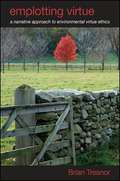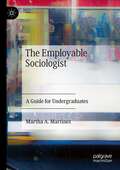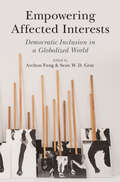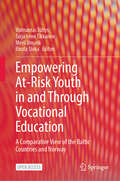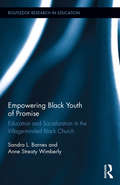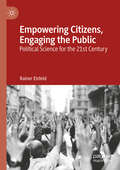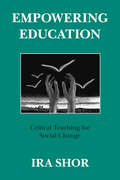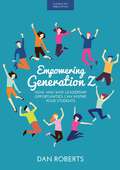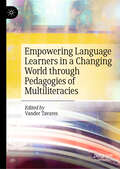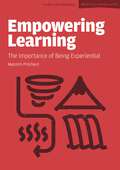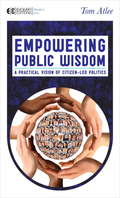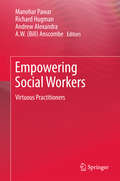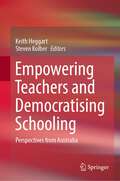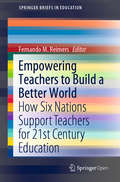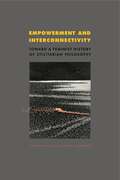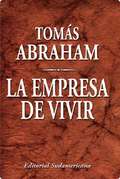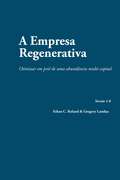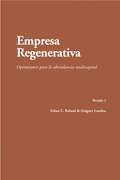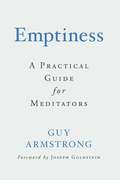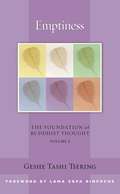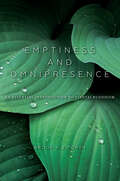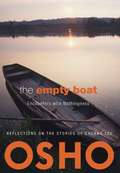- Table View
- List View
Emplotting Virtue: A Narrative Approach to Environmental Virtue Ethics (SUNY series in Environmental Philosophy and Ethics)
by Brian TreanorDespite its ancient roots, virtue ethics has only recently been fully appreciated as a resource for environmental philosophy. Other approaches dominated by utilitarian and duty-based appeals for sacrifice and restraint have had little success in changing behavior, even to the extent that ecological concerns have been embraced. Our actions often do not align with our beliefs. Fundamental to virtue ethics is an acknowledgment that neither good ethical rules nor good intentions are effective absent the character required to bring them to fulfillment. Brian Treanor builds on recent work on virtue ethics in environmental philosophy, finding an important grounding in the narrative theory of philosophers like Paul Ricoeur and Richard Kearney. Character and ethical formation, Treanor argues, are intimately tied to our relationship with the narratives through which we view the human place in the natural world. By reframing environmental questions in terms of individual, social, and environmental narratives about flourishing, Emplotting Virtue offers a powerful vision of how we might remake our character so as to live more happily, more sustainably, and more virtuously in a diverse, beautiful, wondrous, and fragile world.
The Employable Sociologist: A Guide for Undergraduates
by Martha A. MartinezThis book addresses a gap in and outside academia: how to help Sociology undergraduates develop skills for career success while maintaining a sociologically rigorous approach. Matching sociological theories, methods, and knowledge with contemporary capitalistic managerial and work practices, it shows how sociology undergraduates are not only employable but have marketable advantages over graduates of other disciplines. A student following the program embodied in this book will actively nurture a strong sociological identity; create a job search plan integrating personal and disciplinary interests, values, and skills; design job application materials that provide the best fit for specific jobs and organizations; and launch a satisfying career path. Beyond an employment guide, it will facilitate the teaching of career development by Sociology faculty; increase students’ ongoing confidence in their potential; and provide a solid foundation for communicating the transformative power of Sociology to employers and managers in the government, business, and non-profit sectors.
Empowering Affected Interests: Democratic Inclusion in a Globalized World
by Archon Fung Gray, Sean W. D.Many demands for democratic inclusion rest on a simple yet powerful idea. It's a principle of affected interests. The principle states that all those affected by a collective decision should have a say in making that decision. Yet, in today's highly globalized world, the implications of this 'All-Affected Principle' are potentially radical and far-reaching. Empowering Affected Interests brings together a distinguished group of leading democratic theorists and philosophers to debate whether and how to rewrite the rules of democracy to account for the increasing interdependence of states, markets, and peoples. It examines the grounds that justify democratic inclusion across borders of states, localities, and the private sector, on topics ranging from immigration and climate change to labor markets and philanthropy. The result is an original and important reassessment of the All-Affected Principle and its alternatives that advances our understanding of the theory and practice of democracy. This title is also available as Open Access on Cambridge Core.
Empowering At-Risk Youth in and Through Vocational Education: A Comparative View of the Baltic Countries and Norway
by Vidmantas Tūtlys Tarja Irene Tikkanen Meril Ümarik Biruta SlokaThis open access book presents insights on the resiliency strategies of at-risk vocational education and training (VET) students in the field of learning, employment and social integration, in the Baltic countries and Norway. It investigates the ways in which vocational education and training (VET) can enhance the social inclusion of young people at-risk, both in terms of combating school dropout rates, and promoting transitions between various (social) learning contexts, such as school-work transition. Book presents the findings of the analysis of available statistical data disclosing the capacities and potential of the VET systems and providers to empower vulnerable learners in the project partner countries. In the context of VET, this book examines the situations of at-risk young people as they experience, and understand themselves, in it, and explores innovative solutions to address their challenges in collaboration between themselves, their teachers, and other community actors and stakeholders. Finally, it analyses and discusses the innovative pedagogical interventions used in empowering at-risk VET students as implemented in the research project 'EmpowerVET', on the basis of the Educational Learning Lab model developed by researchers from the University of Tallinn School of Educational Sciences.
Empowering Black Youth of Promise: Education and Socialization in the Village-minded Black Church (Routledge Research in Education)
by Sandra L. Barnes Anne Streaty WimberlyInformed by the experiences of 772 Black churches, this book relies on a multidisciplinary, mixed-methodological lens to examine how today’s Black churches address the religious and non-religious educational and broader socialization needs of youth. Drawing from a cultural and ecological framework of village-mindedness, Barnes and Wimberly examine the intersected nature of place, space, and race to propel a conversation about whether and how the Black Church can become a more relevant and empowering presence for youth and the Black community.
Empowering Citizens, Engaging the Public: Political Science for the 21st Century
by Rainer EisfeldThis book is the first comprehensive study to respond to the ongoing debates on political sciences’ fragmentation, doubtful relevance, and disconnect with the larger public. It explores the implications of the argument that political science ought to become more topic-driven, more relevant and more comprehensible for "lay" audiences. Consequences would include evolving a culture of public engagement, challenging tendencies toward liars’ rule, and emphasizing the role of “large” themes in academic education and research, the latter being identified as those areas where severe democratic erosion is occurring – such as escalating income and wealth disparities pushing democracy towards plutocracy, ubiquitous change triggering insecurity and aggression, racist prejudice polarizing societies, and counter-terrorism strategies subverting civil liberties. Political science needs to address these pressing problems ahead of other issues by in-depth research and broadly accessible public narratives, including solution-orientated normative notions. This need provides the final justification for evolving a discipline where problems would take priority over methods and public relevance over sophisticated specialization.
Empowering Education: Critical Teaching for Social Change
by Ira ShorIra Shor is a pioneer in the field of critical education who for over twenty years has been experimenting with learning methods. His work creatively adapts the ideas of Brazilian educator Paulo Freire for North American classrooms. In Empowering Education Shor offers a comprehensive theory and practice for critical pedagogy. For Shor, empowering education is a student-centered, critical and democratic pedagogy for studying any subject matter and for self and social change. It takes shape as a dialogue in which teachers and students mutually investigate everyday themes, social issues, and academic knowledge. Through dialogue and problem-posing, students become active agents of their learning. This book shows how students can develop as critical thinkers, inspired learners, skilled workers, and involved citizens. Shor carefully analyzes obstacles to and resources for empowering education, suggesting ways for teachers to transform traditional approaches into critical and democratic ones. He offers many examples and applications for the elementary grades through college and adult education.
Empowering Generation Z: How And Why Leadership Opportunities Can Inspire Your Students
by Dan RobertsDan Roberts, Headteacher of Devonport High School for Boys in Plymouth, believes it is crucial to empower young people to take control of their future.By building the right culture and environment, educators can help ensure that children can truly flourish and develop into adults that wish to have a positive impact on their local, national and international communities.Crisp, captivating and authentic, the book suggests fresh and practical new ideas and opportunities both within the classroom and outside.Dan Roberts' passion for young people is unmistakable, whether speaking before a TED London audience or advising the Obama administration as part of their education technology reform 2020 plan.
Empowering Generation Z: How And Why Leadership Opportunities Can Inspire Your Students
by Dan RobertsDan Roberts, Headteacher of Devonport High School for Boys in Plymouth, believes it is crucial to empower young people to take control of their future.By building the right culture and environment, educators can help ensure that children can truly flourish and develop into adults that wish to have a positive impact on their local, national and international communities.Crisp, captivating and authentic, the book suggests fresh and practical new ideas and opportunities both within the classroom and outside.Dan Roberts' passion for young people is unmistakable, whether speaking before a TED London audience or advising the Obama administration as part of their education technology reform 2020 plan.
Empowering Language Learners in a Changing World through Pedagogies of Multiliteracies
by Vander TavaresThis book presents conceptual and empirical studies on how pedagogies of multiliteracies can empower language learners, teachers, and teacher educators in an increasingly globalized yet unequal world, with a focus on social justice in language education. The chapters offer critical and innovative pedagogical insights that contribute to re-envisioning language and literacy education in the 21st century in a number of educational contexts, including post-secondary, community, refugee, science, language, and teacher education. From a raciolinguistic critique of monoglossic education in the United States to drama-based pedagogies for refugee learners in Iceland, this book contextualizes language learner empowerment by identifying and confronting ideologies of race, gender, nationality, and language. Creative multimodal and multisensorial pedagogies are enacted through learner-designed plurilingual portfolios, infographics, picturebooks, identity texts, performance, andmuseum-based learning. This book diversifies and enriches current approaches to language education based on pedagogies of multiliteracies that cultivate learner agency, identity, and critical reflection, and it will be of interest to readers with backgrounds in second/foreign language education, TESOL/ESL, sociology of education, and applied linguistics.
Empowering Learning: The Importance Of Being Experiential (World Class Schools)
by Dr Malcolm Pritchard Malcolm PritchardExperience - it is our first teacher in life, our early warning system, and our guide to world discovery. Experience connects the inner self to the outer world. It shapes our thoughts, informs our attitudes, motivates our actions. It is the most common mode of learning for all of humanity. Yet, hidden in plain sight, experiential learning is largely taken for granted by educators and researchers. We assume that experience is largely educational. We simply 'learn by doing' - don't we? There is a world of difference between 'doing' and 'doing intelligently'. By understanding how experience acts as a mechanism to inspire and scaffold memorable learning, we stand to gain greater control over this most powerful and universal force in human development. Learning, empowered by experience, is life-changing for learners; experience, purposefully harnessed, is transformational for schools.
Empowering Learning: The Importance Of Being Experiential (World Class Schools)
by Dr Malcolm Pritchard Malcolm PritchardExperience - it is our first teacher in life, our early warning system, and our guide to world discovery. Experience connects the inner self to the outer world. It shapes our thoughts, informs our attitudes, motivates our actions. It is the most common mode of learning for all of humanity. Yet, hidden in plain sight, experiential learning is largely taken for granted by educators and researchers. We assume that experience is largely educational. We simply 'learn by doing' - don't we? There is a world of difference between 'doing' and 'doing intelligently'. By understanding how experience acts as a mechanism to inspire and scaffold memorable learning, we stand to gain greater control over this most powerful and universal force in human development. Learning, empowered by experience, is life-changing for learners; experience, purposefully harnessed, is transformational for schools.
Empowering Public Wisdom
by Tom AtleeLifelong activist Tom Atlee proposes innovative ways to distill the wisdom of ordinary people in order to better guide public policy. In Empowering Public Wisdom, Atlee recognizes currently popular forms of progressive democracy advocates, such as citizen participation and voter education, but suggests that what is really needed is a re-thinking of the very concept of democracy; Atlee advocates the use of "public wisdom," a collective intelligence that can be drawn upon to guide public policy and action. Reaching beyond partisan politics, Atlee explores how a diversity of views can be engaged around public issues in ways that generate a coherent, shared "voice of the people" that takes most or all of the population's perspectives and needs into account. Atlee's core approach is through "citizen deliberative councils," in which a small group of people randomly selected creates a "mini-public" or a microcosm of the larger population. Citizen councils engage in the study of a public issue and make recommendations to public officials and the community, but disband afterward; when a new issue arises, a new council is formed. Ultimately, Atlee aims even higher, suggesting a possible fourth branch of government to better balance our current democratic system. Combining a radical vision with practical solutions, Empowering Public Wisdom provides a unique and refreshing voice in the political arena.Empowering Public Wisdom is part of the EVOLVER EDITIONS Manifesto Series.From the Trade Paperback edition. on co-intelligence holds some of the keys to enabling us to work with the ever-more complex opportunities in human existence." -- Robert Theobald, author of Turning the Century and The Rapids of Change"Tom Atlee is a unique soul who is fostering the awakening of our collective wisdom."-- Duane Elgin, author of Voluntary Simplicity and Promise Ahead"Tom Atlee's work is an important contribution to the world I want to create." -- Stewart Levine, Esq, author of Getting to Resolution and The Book of Agreement
Empowering Social Workers
by Manohar Pawar Richard Hugman Andrew Alexandra A. W. Bill AnscombeThis book demonstrates the central role of ethical character in effective social work practice. Showcasing select biographies of social workers, it reveals how skilled practitioners have developed such core virtues as compassion, love, commitment, prudence, respect for human dignity and a critical sense of social justice through the course of their working lives, and how they apply these virtues in a wide variety of settings and situations to enhance the well-being of the people and communities they work with. As such, the book offers a powerful and inspiring resource to help educators, students and practitioners understand the unbreakable link between what social workers and other social welfare and social development professionals do and who they are, and thereby cultivate core qualities that should be promoted. "Pawar, Hugman, Alexandra and Anscombe have found a novel and creative way to explore virtues in social work by examining the career contributions of a group of social work practitioners engaged in 'virtuous action'. Their stories are inspiring and they provide much-needed role models for students and practitioners embarking on empowering practice" - Dr. Mel Gray, Professor of Social Work, The University of Newcastle. New South Wales, Australia. "In an age where the virtues of truth, cooperation and "doing the right thing" are increasingly being eroded in public life, this book serves as both an inspiration and invaluable resource to all social work practitioners seeking to reflect on, and improve their practice" - Dr. Martin Ryan, Social Worker, Counsellor/Community Educator, Jesuit Social Services, Melbourne. "The editors are to be commended for examining the virtuous characters of these ten professional social workers. The use of detailed biographies is an innovative and important approach which helps us to appreciate just what a tremendous impact the virtues can have. " - Dr. Christian B. Miller, A. C. Reid Professor of Philosophy, Director, The Character Project, Wake Forest University, USA.
Empowering Teachers and Democratising Schooling: Perspectives from Australia
by Keith Heggart Steven KolberThis edited book brings together teachers and education academics who are committed to education about, for and through democracy. It presents a diverse range of viewpoints about the challenges facing educators working across different sectors and discusses ways to challenge issues like neoliberalism, excessive managerialism and accountability and privatisation. It also engages with the times that education has, and continues, to fail students. This book outlines both logistical and ideological challenges which educators committed to democracy face and describes innovative approaches they have adopted, including networking, the use of social media and digital tools and extending their reach beyond their local communities to international audiences. It encourages conversations about how educators and academics might re-commit to education for democracy and generate further avenues for discussion and action by educators and academics.
Empowering Teachers to Build a Better World: How Six Nations Support Teachers for 21st Century Education (SpringerBriefs in Education)
by Fernando M. ReimersThis open access book presents a comparative study on how large-scale professional development programs for teachers are designed and implemented. Around the world, governments and educators are recognizing the need to educate students in a broad range of higher order cognitive skills and socio-emotional competencies, and providing effective opportunities for teachers to develop the expertise needed to teach these skills is a crucial aspect of effective implementation of curricula which include those goals. This study examines how large-scale efforts to empower teachers for deeper instruction have been designed, how they have been implemented, and their outcomes. To do so, it investigates six programs from England, Colombia, Mexico, India, and the United States. Though all six are intended to broaden and deepen students’ curricular aspirations, each takes this expansion of curricular goals in a different direction.The ambitious education reforms studied here explicitly focus on building teachers’ capacity to teach on a broader set of goals. Through a discerning analysis of program documents, evaluations, and interviews with senior leaders and participants in the programs, the book identifies the various theories of action used in these programs, examines how they were implemented, and discusses what they achieved. As such, it offers an indispensable resource for education leaders interested in designing and implementing professional development programs for teachers that are aligned with ambitious instructional goals.
Empowerment and Interconnectivity: Toward a Feminist History of Utilitarian Philosophy
by Catherine Villanueva GardnerFeminist history of philosophy has successfully focused thus far on canon revision, canon critique, and the recovery of neglected or forgotten women philosophers. However, the methodology remains underexplored, and it seems timely to ask larger questions about how the history of philosophy is to be done and whether there is, or needs to be, a specifically feminist approach to the history of philosophy. In Empowerment and Interconnectivity, Catherine Gardner examines the philosophy of three neglected women philosophers, Catharine Beecher, Frances Wright, and Anna Doyle Wheeler, all of whom were British or American utilitarian philosophers of one stripe or another. Gardner’s focus in this book is less on accounting for the neglect or disappearance of these women philosophers and more on those methodological (or epistemological) questions we need to ask in order to recover their philosophy and categorize it as feminist.
Empowerment and Interconnectivity: Toward a Feminist History of Utilitarian Philosophy
by Catherine Villanueva GardnerFeminist history of philosophy has successfully focused thus far on canon revision, canon critique, and the recovery of neglected or forgotten women philosophers. However, the methodology remains underexplored, and it seems timely to ask larger questions about how the history of philosophy is to be done and whether there is, or needs to be, a specifically feminist approach to the history of philosophy. In Empowerment and Interconnectivity, Catherine Gardner examines the philosophy of three neglected women philosophers, Catharine Beecher, Frances Wright, and Anna Doyle Wheeler, all of whom were British or American utilitarian philosophers of one stripe or another. Gardner’s focus in this book is less on accounting for the neglect or disappearance of these women philosophers and more on those methodological (or epistemological) questions we need to ask in order to recover their philosophy and categorize it as feminist.
La empresa de vivir
by Tomás AbrahamEl autor analiza y discute la empresa como nuevo monumento cultural, la tarea de los expertos en calidad de vida y su función en una nueva sociedad terapéutica. Tomas Abraham inicia una pesquisa filosófica y no se detiene ante las impugnaciones que dictan «el buen gusto» y la convivencia (la que esconde las contradicciones para simular seriedad y rigor intelectual). No lo detiene. Observa, analiza, compulsa. Sus preguntas no interrogan esas zonas del discurso para las cuales se han inventado ya benévolas excusas, sino las otras, las peligrosas. Desde 1989, reflexiona Abraham, el factor económico es la clave que permite descifrar los anhelos y las frustraciones de la sociedad. ¿Por qué? Porque el factor económico no se reduce a la economía, no se limita a la producción y a la distribución de riquezas sino que acusa la visible emergencia de nuevas formas de vida. El factor económico revela el diagrama de las mutaciones culturales. De las historias de vida de los archimillonarios al encuadre histórico de la ideología empresarial, de «la puesta en sorna» (con el mayor respeto) de la literatura de autoayuda a la meditación sobre la moral y el dolor en los campos del exterminio, La empresa de vivir, como los libros anteriores del autor, traza una línea osada y firme e incorpora al pensamiento argentino una nueva manera de hacer las cosas. Una nueva manera capaz de abrir discusiones aparentemente concluidas o censuradas, de expandir los efectos de un conflicto intelectual hacia áreas desprestigiadas o ignoradas de inaugurar una pasión para abolir la ironía autoindulgente y los entredichos ufanos. Porque logra trasformar el malestar en un problema y la dificultad y el obstáculo en una interrogación crítica, La empresa de vivir es un libro decisivo. Y algo más, algo que merece nuestra gratitud o por lo menos nuestra atención: porque ese libro decisivo e importante es también una investigación filosófica donde la busca de la verdad no renuncia al humor y se permite reír y hacernos reír.
A Empresa Regenerativa
by Ethan Roland Gregory Landua Patrícia PintoAs 8 Formas de Capital: Um novo modelo financeiro em prol de uma abundância otimizada Num mundo de sistemas ecológicos e sociais danificados, com uma economia global fragilizada e com as constantes alterações climáticas, o negócio tal como o conhecemos, poderá desenvolver-se, mas também pode correr o risco de não conseguir sobreviver. Nada é mais aceitável do que alcançar os lucros financeiros, extrair proveitos abundantes e proporcionar uma boa prosperidade que é fundamental aos nossos terrenos e fontes de água. As empresas precisam de um novo modelo com o qual possam abordar, de uma forma mais abrangente, o mundo e dar importância à necessidade da introdução de um processo novo no sistema enquanto se elucidam as pessoas nas tomadas de decisão mais relevantes. As 8 Formas de Capital é o modelo a seguir. Ao articularmos estas formas múltiplas de capital nas transações diárias, estamos a abrir portas a uma realidade mais abrangente sobre os lucros e sobre a economia. A Empresa Regenerativa define a diferença existente entre os sistemas degenerativos, os sustentáveis e os regenerativos. Também articula os quatro fatores da empresa regenerativa e os princípios para a concepção de empresa ecológica regenerativa. O Instituto "Regenerative Enterprise Institute", ou o seu representante em Portugal, também oferece serviços de formação e consultoria às empresas e corporações que querem adaptar-se e aderir à resolução dos sistemas regenerativos.
Empresa regenerativa. Optimizarse para la abundancia multicapital
by Ethan Roland Gregory Landua Noelia JiménezYa no es aceptable generar beneficios económicos extrayendo la riqueza viva fundamental de nuestras tierras y aguas. Las empresas necesitan un nuevo modelo con el que interpretar el mundo y un nuevo proceso para el diseño de sistemas integrales y la toma de decisiones. 8 formas de capital es ese modelo. Al articular las múltiples formas de capital con las que realizamos transacciones cada día, se abre la puerta a un enfoque evolutivo de la economía y los beneficios. Nuestro nuevo libro Empresa regenerativa define la diferencia entre los sistemas degenerativos, sostenibles y regenerativos y articula los cuatro factores de una empresa regenerativa así como los principios para diseñar ecologías de empresas regenerativas.
Emptiness: A Practical Guide for Meditators
by Joseph Goldstein Guy ArmstrongIf everything is empty, then what ceases in Nirvana and is born in rebirth? How can you live in the world without feeling trapped by it? Guy Armstrong tackles these questions and more in this richly informed, practical guide to emptiness for the meditator.It may seem odd for emptiness to serve as the central philosophy of a major religion. In fact, emptiness points to something quite different than “nothingness” or “vacancy.” And by developing a richer understanding of this complex topic, we can experience freedom as we live consciously in the world. Guy Armstrong has been a leading figure and beloved teacher of insight meditation for decades. In this book, he makes difficult Buddhist topics easy to understand, weaving together Theravada and Mahayana teachings on emptiness to show how we can liberate our minds and manifest compassion in our lives.
Emptiness
by Lama Thubten Zopa Rinpoche Geshe Tashi Tsering Gordon McdougallIn Emptiness, the fifth volume in The Foundation of Buddhist Thought series, Geshe Tashi Tsering provides readers with an incredibly welcoming presentation of the central philosophical teaching of Mahayana Buddhism. Emptiness does not imply a nihilistic worldview, but rather the idea that a permanent entity does not exist in any single phenomenon or being. Everything exists interdependently within an immeasurable quantity of causes and conditions. An understanding of emptiness allows us to see the world as a realm of infinite possibility, instead of a static system. Just like a table consists of wooden parts, and the wood is from a tree, and the tree depends on air, water, and soil, so is the world filled with a wondrous interdependence that extends to our own mind and awareness. In lucid, accessible language, Geshe Tashi Tsering guides the reader to a genuine understanding of this infinite possibility.
Emptiness and Omnipresence: An Essential Introduction to Tiantai Buddhism (World Philosophies Ser.)
by Brook A. ZiporynTiantai Buddhism emerged from an idiosyncratic and innovative interpretation of the Lotus Sutra to become one of the most complete, systematic, and influential schools of philosophical thought developed in East Asia. Brook A. Ziporyn puts Tiantai into dialogue with modern philosophical concerns to draw out its implications for ethics, epistemology, and metaphysics. Ziporyn explains Tiantai's unlikely roots, its positions of extreme affirmation and rejection, its religious skepticism and embrace of religious myth, and its view of human consciousness. Ziporyn reveals the profound insights of Tiantai Buddhism while stimulating philosophical reflection on its unexpected effects.
The Empty Boat
by Osho Osho International FoundationTalks on the Stories of Chuang Tzu. OSHO revitalises the 300-year-old Taoist message of self-realization through the stories of the Chinese mystic, Chuang Tzu. He speaks about the state of egolessness, "the empty boat"; spontaneity, dreams and wholeness; living life choicelessly and meeting death with the same equanimity . Available in a beautiful new edition, this series overflows with the wisdom of one who has realized the state of egolessness himself.
